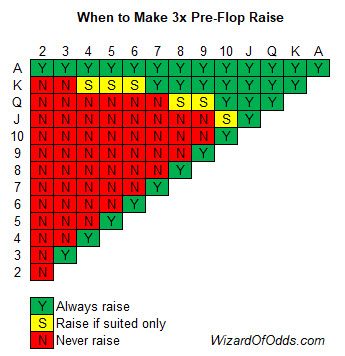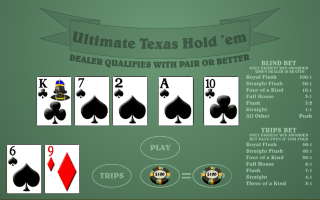On this page
Ultimate Texas Hold 'Em (3x)
Introduction
Let me say right up front that I now doubt this game actually exists. I got bad information from my forum at Wizard of Vegas about the game. It just goes to show to not believe every report you read online, even if a good poster verified with a 99.996% degree of confidence. I spent a lot of time on this page, so will leave it up anyway, but I invite you to not bother with it.
This page covers a variant of Ultimate Texas Hold'em® where the player may raise 3x only before the flop. This version can be found at the Scarlet Pearl casino in Biloxi, MS. For the standard version, allowing the player to raise 4x before the flop, please see my page on Ultimate Texas Hold 'Em.
Ultimate Texas Hold'em® is a poker-based casino game in which the player may make one raise at any time during the course of the hand. The earlier the raise is made the higher it may be. Unlike other poker-based games, raises made after the ante still have action, even if the dealer doesn't open. This game was invented by Roger Snow of Shuffle Master. The same base game, with some minor rule changes, is also distributed by Galaxy Gaming under the name Heads Up Hold 'Em. Evolution Gaming, a supplier of live dealer games to Internet casinos, refers to the game as "Extreme Texas Hold 'Em" in some jurisdictions, for legal reasons.
ULTIMATE TEXAS HOLD ’EM® is a registered trademark of Bally Gaming, Inc. and is used with permission on this website.
Where To Play Ultimate Texas Hold'Em Online for Real Money
- SpinIt Casino
- ComeOn
- Fantasino
- Bao Casino
- Mbit Casino
How To Video
The following video is based on the standard version, where the player can raise 4x before the flop.
Rules
Following are the rules for what I call the inferior 3x version of Ultimate Texas Hold 'Em, addressed on this page.
- The game is played with a single ordinary 52-card deck.
- The player must make an equal bet on both the Ante and Blind, and can also make an optional Trips bet.
- Two cards are dealt face down to the player and dealer. The player may look at his own cards.
- The player can check or make a Play bet equal to three times the Ante.
- The dealer turns over three community cards.
- If the player previously checked, then he may make a Play bet equal to two times his Ante. If the player already made a Play bet, then he may not bet further.
- Two final community cards are turned over.
- If the player previously checked twice, then he must either make a Play bet equal to exactly his Ante, or fold, losing both his Ante and Blind bets. If the player already raised he may not bet further.
- The player and dealer will both make the best possible hand using any combination of their own two cards and the five community cards.*
- The dealer will need at least a pair to open.
- The following table shows how the Blind, Ante, and Play bets are scored, according to who wins, and whether the dealer opens.
Scoring Rules
Winner Dealer Opens Blind Ante Play Player Yes Win Win Win Player No Win Push Win Dealer Yes Lose Lose Lose Dealer No Lose Push Lose Tie Yes or No Push Push Push - Winning Ante and Play bets pay 1 to 1. Winning Blind bets pay according to the following pay table.
Blind Bet Pay Table
Player Hand Pays Royal flush 500 to 1 Straight flush 50 to 1 Four of a kind 10 to 1 Full house 3 to 1 Flush 3 to 2 Straight 1 to 1 All other Push - The Trips bet will pay according to the poker value of the player's hand regardless of the value of the dealer's hand. Pay table for the Trips bet can be found in my standard page on Ultimate Texas Hold 'Em.
Analysis
There are 52 possible outcomes of each hand. The table below shows the probability of each and the contribution to the total return, assuming optimal strategy. A 3x raise is referred to as a "large raise," a 2x raise as "medium," and 1x as "small."
The lower right cell shows a house edge of 9.67% per Ante bet. What this means, for example, is if you bet $100 and both the Ante and Blind initially, then you can expect to lose $9.67 cents on average. However for comparison to other games I believe the Element of Risk is more appropriate to look at. The average total amount bet by the end of the hand is 3.67 times the ante bet. So the element of risk would be 9.67%/3.67 = 2.63%. The standard deviation, relative to the Ante bet, is 4.94.
By way of comparison. In the standard version of Ultimate Texas Hold 'Em, where the player may raise 4x before the flop, the house edge is 2.19% and the element of risk is 0.53%. In other words, the player can expect to lose five times as much in this 3x version.
Wizard Strategy
The following is my "Wizard Strategy" for Ultimate Texas Hold 'Em®.
Large Raise: The following table shows when to make the 4X raise.

Medium Raise: Make the 2X raise with any of the following:
- Two pair or better.
- Hidden pair*, except pocket deuces.
- Four to a flush including a hidden 10 or better to that flush
* Hidden pair = Any pair with at least one card in your hole cards (thus the pair is hidden to the dealer).
Small Raise: Make the 1X raise with any of the following, otherwise fold:
- Hidden pair or better.
- Less than 21 dealer outs beat you.
Example
What I mean by an "out" is a dealer hole card that will cause you to lose. Let's look at this situation as an example.

In the example above, there 15 cards that will pair the dealer and beat you (three suits each of K, 7, 2, A, and 10). Then there are the two ranks (jacks and queens) which will out-kick the player. All four jacks and queens remain in the decks, so that is 2×4=8 more cards that will beat you. So, we're up to 15+8=23. We don't count the other three nines because those will result in a push. So, because there are only 23 outs (21 or more), we fold.
BTW, using my Ultimate Texas Hold 'Em® calculator, we see that the expected value of raising this hand is -2.136364, which is less than the -2 of folding.
I get asked a lot about combinations of cards that will beat the player. For example, any two dealer spades that would give the dealer a flush in the example above. The answer is no. It would really make things complicated if the strategy accounted for double-card combinations that would beat the player.
The second and third decision points are influenced by the James Grosjean strategy, for which I have great respect, as I do for all of Grosjean's work. I highly recommend his strategy if you want to something even more powerful than my simple strategy above.
All Side Bets
For the rules and analysis of a host of side bets, including the Trips bet, please see my page on standard Ultimate Texas Hold 'Em
Internal Links
- Ultimate Texas Hold 'Em® game. Play for free with an advice feature to catch your mistakes.
- Ultimate Texas Hold 'Em® calculator. Put in any cards to determine the best play.
- Ultimate Texas Hold 'Em® appendix 1. Details on the odds before the flop.
- Heads Up Hold 'Em. Similar game, offering bad beat bonuses, but 3x raise only after two cards.
- Florida Variant of Trips Bet, where the player must also beat the dealer.
External Links
- Wikipedia — Entry on Ultimate Texas Hold 'Em.
- Discountgambling.net has an outstanding analysis of this game, including what I call his "nut kicker" strategy for the second and third decision points.
- Shufflemaster's Ultimate Texas Hold 'Em® page.
- Demo game — Play this licensed demo game at our sister site Latest Casino Bonuses.
- Discussion about this 3x version in my forum at Wizard of Vegas.




